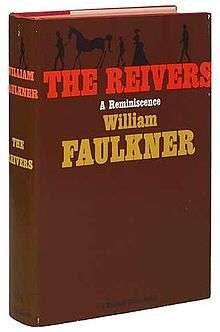The Reivers
 First edition | |
| Author | William Faulkner |
|---|---|
| Country | United States |
| Language | English |
| Publisher | Random House |
Publication date | 1962 |
| Media type | Print (hardback & paperback) |
| Preceded by | The Mansion (1959) |
The Reivers, published in 1962, is the last novel by the American author William Faulkner. The bestselling novel was awarded the Pulitzer Prize for Fiction in 1963. Faulkner previously won this award for his book A Fable, making him one of only three authors to be awarded it more than once. Unlike many of his earlier works, it is a straightforward narration and eschews the complicated literary techniques of his more well known works. It is a picaresque novel, and as such may seem uncharacteristically lighthearted given its subject matter. For these reasons, The Reivers is often ignored by Faulkner scholars or dismissed as a lesser work. He previously had referred to writing a "Golden Book of Yoknapatawpha County" with which he would finish his literary career. It is likely that The Reivers was meant to be this "Golden Book". The Reivers was adapted into a 1969 film directed by Mark Rydell and starring Steve McQueen as Boon Hogganbeck.
Plot
The basic plot of The Reivers takes place in the first decade of the 20th century. It involves a young boy named Lucius Priest (a distant cousin of the McCaslin/Edmonds family Faulkner wrote about in Go Down, Moses) who accompanies a family friend named Boon Hogganbeck to Memphis, where Boon hopes to woo a prostitute called "Miss Corrie". Since Boon has no way to get to Memphis, he steals (reives,[1] thereby becoming a reiver) Lucius's grandfather's car, the first car in Yoknapatawpha County. They discover that Ned McCaslin, a black man who works with Boon at Lucius's grandfather's horse stables, has stowed away with them (Ned is also a blood cousin of the Priests). When they reach Memphis, Boon and Lucius stay in the brothel while Ned disappears into the black part of town. Soon Ned returns, having traded the car for a racehorse.
The remainder of the story involves Ned's attempts to race the horse in order to win enough money to help out his relative, and Boon's courtship with Miss Corrie (whose real name is Everbe Corinthia). Lucius, a young, wealthy, and sheltered boy, comes of age in Memphis. He comes into contact for the first time with the underside of society. Much of the novel involves Lucius trying to reconcile his genteel and idealized vision of life with the reality he is faced with on this trip, portrayed in his struggle between Virtue and Non-Virtue. He meets Corrie's nephew, a boy a few years older than Lucius who acts as his foil and embodies many of the worst aspects of humanity. He degrades women, respects no one, blackmails the brothel owner, steals, and curses. Eventually Lucius, ever the white knight, fights him to defend Corrie's honor. She is so touched at his willingness to stand up for her that she determines to become an honest woman.
The climax comes when Lucius rides the horse (named Coppermine, but called Lightning by Ned) in an illicit race. Coppermine is a fast horse, but he likes to run just behind the other horses so he can see them at all times. Ned convinces him to make a final burst to win the race by bribing him with what may be a sardine. After they win the race, Lucius's grandfather shows up. This time Ned does not do the sardine trick, and Coppermine loses. Ned has bet against Coppermine in this race, and the poor black stable hand is able to get the better of the rich white grandfather.
The story ends with the news that Boon and Miss Corrie have married and named their first child after Lucius.
Boon Hogganbeck
Boon is also a major character in Go Down, Moses, where he appears as a McCaslin/Priest family retainer of limited education and interests. In The Reivers he shows the unexpected qualities of a car lover and a romantic hero; his marriage ties up a major "loose end" in the Faulkner canon.
Ned McCaslin
Ned's character resembles that of his distant relative Lucas Beauchamp in many ways. Like Lucas, he at least pretends to work for his white cousins while constantly outwitting them in various ways. The Priests invariably find it in their hearts to forgive him.
Cars
The story offers some fascinating depictions of the first automobiles in American society; how they were obtained, how they were cared for, how they were regarded by their new owners. The Priests make their living from transportation and logistics (they run a livery stable), and grandfather and grandson both sense that this new invention will have a powerful effect on their lives.
References
External links
| Preceded by The Mansion |
Novels set in Yoknapatawpha County |
Succeeded by none |
| Awards | ||
|---|---|---|
| Preceded by The Edge of Sadness by Edwin O'Connor |
Pulitzer Prize for Fiction 1963 |
Succeeded by no award given (1964) The Keepers of the House by Shirley Ann Grau (1965) |